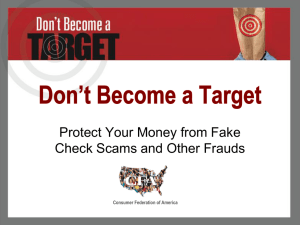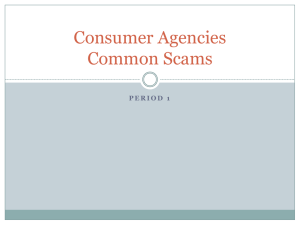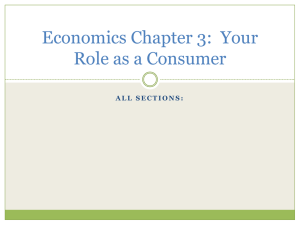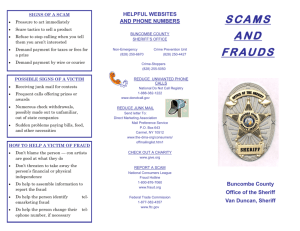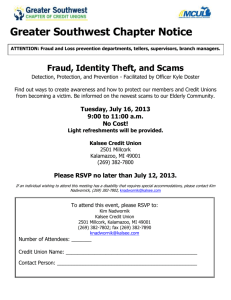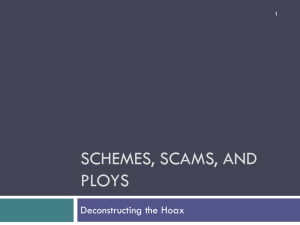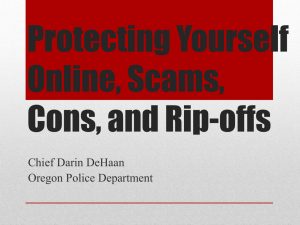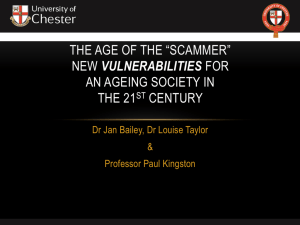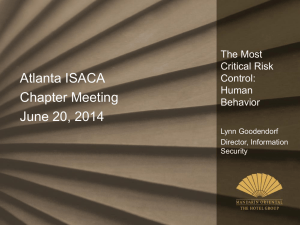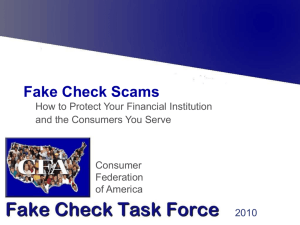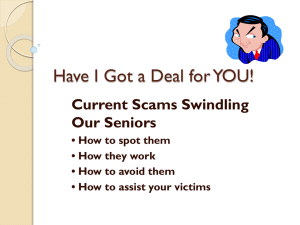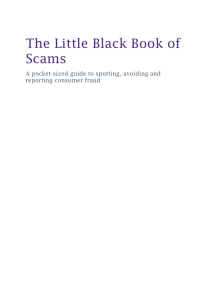Don't Become a Target - Consumer Federation of America
advertisement
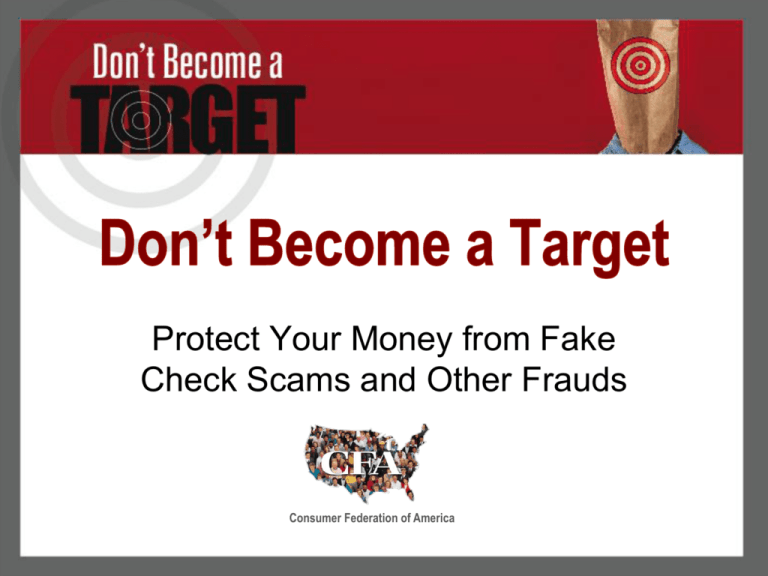
Protect Your Money from Fake Check Scams and Other Frauds Consumer Federation of America An official-looking envelope arrives in the mail with a check or money order for $20,000 inside. The letter says you have won $4 million in a sweepstakes or lottery. You just need to wire $3,000 for taxes to claim the rest of your winnings. Is this your lucky day? It’s a fake check scam that will cost you thousands. Have you encountered any of these situations? • You unexpectedly receive notice that you are getting a grant from the government or a foundation and a processing fee is required. • A company wants you to work at home as a mystery shopper or to process payments and instructs you to send money somewhere as part of the job. • Someone sends you more than the asking price for an item you are selling and instructs you to wire the extra money somewhere else. • A stranger sends part of the profits you were promised in a foreign business deal and asks you to pay legal fees to get the rest. • Someone you meet online asks you to cash a check or money order as a favor. These are all scams! No matter the story, fake check scams always involve someone giving you a genuine-looking check or money order and asking you to wire money somewhere in return. After you deposit or cash the check or money order and send the money, you learn that it was phony. But by that time, the crook has the money. True or False? When you deposit or cash a check or money order from someone, your bank or credit union confirms that it is good before allowing you to take the money? False! You have the legal right to get the cash quickly, usually within 1-2 days. But your bank or credit union can’t tell if there is a problem until the check or money order goes through the system to whoever supposedly issued it. This can take weeks. How the Processing System Works Which is the correct answer? If you deposit or cash a check or money order from someone and later learn that it was phony, who is responsible to give the money back to your bank or credit union? A. You B. The person who gave you the check or money order C. No one, your bank or credit union takes the loss The correct answer is You! You are responsible for the check or money order that you deposit or cash because you are in the best position to know if the person who gave it to you is trustworthy. What have you got to lose? Plenty! Victims of fake check scams lose an average of $3,000 to $4,000. Once the counterfeit is discovered, your bank or credit union will deduct the amount of the check or money order from your account. But that’s not all. • If there isn’t enough in your account to cover the amount, you could face collection or be sued. • Payments you made from your account could bounce when the amount of the check or money order is deducted. • Your account may be frozen or closed. • You could be reported to a database of checking account abusers, making it difficult to open another account. • Some victims are even charged with check fraud. What if you cashed the check or money order at a check cashing service or a store? You’ll have to repay the money, and if you can’t you may face legal action. If you think you are a fake check victim, try to resolve the problem immediately with the bank, credit union, or check-casher. It may be possible to avoid having your account closed or being reported as an account abuser. How can you protect yourself? You can’t detect phony checks or money orders by looking at them. These counterfeits are so realistic, even tellers can be fooled! How can you protect yourself? The best way to protect yourself is to remember that there is no legitimate reason why anyone would give you a check or money order and ask you to send money anywhere in return. If that’s the deal, it’s a scam. But it’s also important to know that there are similar scams that don’t use fake checks: • • • • Phony sweepstakes, lotteries and grants Work-at-home schemes Foreign business deals Sweetheart swindles Sometimes the crooks simply ask you to send money to get what they have falsely promised. Using realistic-looking checks or money orders just helps to make their stories more convincing. So what should you know to detect fraud? Sweepstakes and lotteries • Winners are not notified by regular mail or email. • Winners are never asked to pay to claim a prize. • Winners pay the taxes directly to the government. Grants • The government and foundations don’t just hand out “free” money. • Grants are mainly provided to agencies and organizations for specific projects. • Grants are usually based on extensive applications. Foreign Business Deals • Legitimate foreign companies or agencies don’t contact individuals unexpectedly offering deals. • None of the stories about fortunes or big profits are ever true. • These crooks just want to steal your money and sometimes your personal information such as your bank account number, too. Work-at-Home Schemes • Legitimate foreign companies don’t need to hire individuals in the U.S. to receive their payments. • Legitimate companies that hire “mystery shoppers” don’t ask for money and they pay after the job is done. • Work-at-home schemes often target people who list their contact information on job-finder Web sites. Sweetheart Swindles • Scammers lurk in chat rooms, newsgroups and social networking sites looking for people to befriend. • Once they have established a relationship, they ask for money for an emergency or to come to the U.S. • It is impossible to trace them and recover the money. Another scam to watch for: You receive a call or email from someone who claims to be a friend or relative and needs you to send money right away because they have had an accident, been mugged, or had some other problem. Always verify the story with another relative or mutual friend before sending any money. Payment by money transfer service is the common thread in many scams. Scammers ask for payment this way because it’s fast and hard to trace. They can pick up the payment in cash, and often use false identities to do so. Only use money transfer services to send funds to people you have met in person and known for a long time. Be on guard! Fraud is constantly evolving, so be on guard for anything that seems suspicious. For instance, crooks posing as buyers on online auction sites are pretending to make PayPal payments to the sellers for more than the purchase price and asking them to send the excess amount somewhere else – a scenario similar to fake check scams. Keep your money out of crooks’ pockets! Since money sent to crooks is often gone forever… STOP THINK GET ADVICE …from your state or local consumer protection agency or other trusted sources before you agree to anything. Where can you learn more? Consumer Federation of America www.consumerfed.org/fakecheckscams National Consumers League www.fraud.org and www.fakechecks.org Federal Trade Commission www.ftc.gov/bcp/consumer.shtm 1-877-382-4357 (TTY 1-866-653-4261) U.S Postal Inspection Service www.deliveringtrust.com 1-877-876-2455 (select option 4 for mail fraud)
